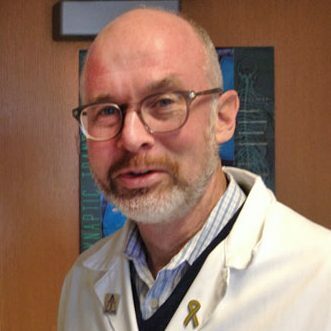
Martin Carroll, MD
Activation of Signal Transduction Pathways in Leukemia
Leukemia is a disease in which the bone marrow produces an abnormally high number of white blood cells that do not mature into normally functioning white blood cells capable of fighting infection. There is considerable evidence that both normal hematopoietic cells (precursor cells that mature into functional blood cells) and leukemic white blood cells require substances known as cytokines to support their growth. Cytokines are hormones that act locally on cells, causing different effects depending on the cytokine and the type of cell it is acting on. Cytokines stimulate specific receptors on cells, activating a chain of biochemical events known as a signal transduction cascade, that ultimately brings about an intended effect. Because the growth and survival of leukemic blood cells may depend on cytokines and the signal transduction cascades they trigger, it is reasonable to believe that a greater understanding of cytokines and signal transduction pathways may lead to novel treatments for leukemia. At the same time, it may lead to new ways to protect normal cells in patients undergoing chemotherapy. Dr. Carroll proposes to examine the role of different signal transduction pathways in the growth and survival of leukemic cells. He will also evaluate, both alone and in combination with conventional chemotherapeutic agents, agents that inhibit different signal transduction pathways for their potential as therapeutic agents in malignancies of the blood.